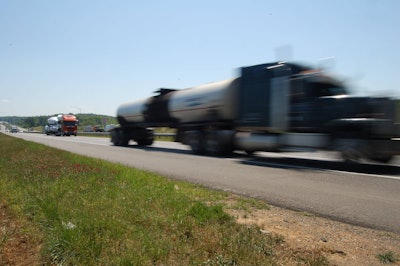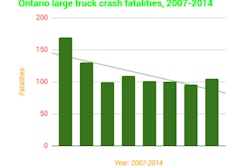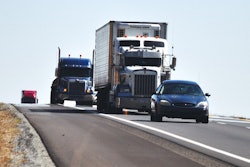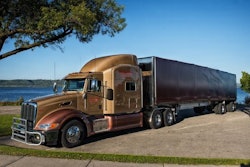 The comment period for FMCSA’s and NHTSA’s proposed rule to mandate speed governors on heavy-duty trucks ended Dec. 7.
The comment period for FMCSA’s and NHTSA’s proposed rule to mandate speed governors on heavy-duty trucks ended Dec. 7.Upwards of 4,500 comments were received by the Federal Motor Carrier Safety Administration over the last three months on the agency’s proposed rule to mandate speed limiting devices on heavy trucks, and most trucker commenters railed against the rule and its potential effects on small business truckers.
The comment period for the proposed rule closed just before midnight Eastern time Wednesday, Dec. 7. In the proposal, FMCSA and the National Highway Traffic Safety Administration sought input from the trucking industry on three potential speeds for trucks to be limited to – 60 mph, 65 mph and 68 mph. The rule stated all new trucks would be required to leave the manufacturer with the speed cap set if the rule were to be enacted.
A large majority of comments from truck drivers are in opposition of the rule. A sample of the comments from trucking industry stakeholders can be seen below:
“I have driven commercial motor vehicles for 22 years in a safe and timely manner. I firmly believe that limiting every commercial motor vehicle’s speed to a common speed will increase accidents, fatigue and road rage incidents across the United States. I implore you to reconsider this ruling and to not govern us in this manner. What may work in other countries and in eastern states will not work across all of our vast countryside. Stop over-regulating our industry and causing unsafe conditions amongst the drivers of this great nation.” – James Williams
“Yes I make my living driving a tractor trailer. With that being said, I am not in favor of the speed limiter. Put yourself in my shoes, with this option you are forcing us to work more hours for the same or less pay. General motoring public hates us trucks because he hold them up. no one wants to be ‘stuck behind the big ol slow truck!’ Govern all the trucks at the same speed (well under the posted speed limit) is a recipe for disaster in my opinion. The need for quality drivers is the wish of the government and the trucking companies, but the regulations are driving a lot of quality drivers right out of career choice.” – Mike Hemmeter
“Problems that I see that would arise from limiting the speed of trucks…you’re going to have more risky behavior by other motorists trying to get around all the slower trucks this is a bottleneck to them and will make matters worse… I ask you do a much larger scale study on what the effect would be. I ask that you not take lightly what this can do not only to our economy and our industry but to our roadways.” – Josiah Gonzalez
“I am an owner-operator with 36 years’ experience. For the last 19 years, I have been operating a one-man regional delivery business. In this business every minute counts, I have tight delivery windows and wholesale prices that change during the day. I have operated this business safely in a state that has a 75 mph limit. The most dangerous thing on the road is someone driving slower than the flow of traffic. Speed is not an issue, a number of western states have a 80 mph speed limit, with no problems. If this proposal becomes law I will be forced to close my business because I would not be able to operate it in a safe and efficient manner. In researching this subject I have found the frequency of interactions with other vehicles by a vehicle traveling 10 mph below the posted speed limit is 227 percent higher than when moving at traffic speed. More interaction of vehicles leads to a greater chance of accidents. The proposal argues that speed limiters are necessary in order to achieve fuel savings and reductions in greenhouse gas emissions (GHGs). But in fact under speed limiters, more trucks will be needed to deliver the same amount of freight, thus using more fuel and emitting more GHGs. Additionally, other vehicles will be speeding up to pass trucks and thereby using more fuel.” – Dan Chafetz
“As a professional driver of combination vehicles with over 2,500,000 miles and no preventable accidents I feel that the proposed speed limiter mandate is based on special interest groups and the furthering of their agenda, and not on scientific facts and studies conducted by actual safety organizations. Speed limiters on trucks only will not reduce accidents, but will cause more frustration and aggression by the drivers of surrounding vehicles. There is already too much of this on our highways. A uniform speed limit for all vehicles has been proven to be the safest for all vehicles. If speed limiters are to be mandated they should be for all vehicles on our nation’s highways, and they should all be at one uniform speed.” – David Bloom
“I am a truck driver driving a truck that is governed at 65, and when I’m driving down a two-lane state highway when the speed limit goes up to 70-75 I usually have a lot of cars behind me day and night mostly trying to pass me. In a lot of situations they get angry and frustrated [and] try to pass me out of anger and almost getting hit by the oncoming traffic…There’s been a lot of situations where I needed a little bit more speed to get out of danger situations which I couldn’t take so I had to slow down and made it more dangerous for other vehicles.” – William Davis, Vienna, W.V.
“While the concept of limiting speeds in heavy equipment would seem, on its face, to be a reasonable idea, proposing a rule without the specific limit of such speed to be identified until a date sometime later sounds all too familiar. Anyone who has traveled most any interstate highway can attest to the fact that some heavy duty trucks and buses are both operating too fast and traveling with too little following distance from vehicles ahead. However, far more private automobiles, partly due to the sheer numbers of those versus heavy duty buses and trucks, are driven recklessly and in a manner that is both hazardous to the occupants and other motorists. This proposed rule, while well intended, would seem to be a case of regulators selecting the largest animal target in the hunt and opening fire on it, when the far greater danger is from the smaller predator hidden in the grass.” – Kenneth Henry, Owosso, Mich.
“I am an owner-operator. I feel that if the speed limiter rule is passed I will be losing $20,000 to $30,000 a year. If I want to run the speed limit, a lot of states it’s 70mph, then I should be able to. By setting the limit there will be more accidents because cars are doing 70mph or more in most cases. This rule would affect my way of life by not making the money that I am currently used to.” – Patrick Carroll
“I have driven a speed limited truck for five years, in fact it is what I learned to drive a truck in. I frequently referred to the speed limiter as the suicide device. There are times when speeding up is the safest possible option, after which you then slow down. If your trailer goes out of line for any reason and you are even near your limiter speed, you may not be able to recover. Though honestly, the primary reason you shouldn’t do this is the research that shows this will make the roads less safe. Not to mention it won’t prevent speeding or going too fast for conditions, the most important of which is too fast for conditions. That can only be resolved via education and proper training, and enforcing companies to rely on the driver’s decision in situations that risk their life and the lives of those around them.“ – Ronald McCall
“I have driven trucks all my life in the farming business. Recently, I became licensed with a CDL to drive throughout our country. What I have seen concerning the limiting of truck speed is that the data is proposed backwards. It is a fact that that an 80K truck will cause more damage at a higher speed, however, if you calculate the number of accidents per mile driven, the possibility of an accident becomes considerably less. We are looking at the problem from the wrong side. Reconsider your stance to limit the honest, hard working driver while letting the unskilled, dangerous motoring public run rampant.” – Michael Knox
“I currently drive a speed limited truck, and I will tell you that it causes me to be more aggressive than I like. I have 38 years’ experience and 4 million safe miles. There are several times a day that I can’t move over to allow merging traffic to enter safely, which in turn forces me to ignore them, since I have the right of way. When I do have the option to move over, I will but then the new traffic will sit beside me causing the traffic behind me to move over and dangerously attempt to pass me on the right which is attempting suicide.” – Brad Smith
“As a driver of speed limited trucks, I can tell you first hand, they are not the safety panacea that only a handful of supporters of them state. As a former road construction laborer, I more than anyone know how important workplace safety is in a construction zone. When I have honored the speed limit which is most of the time, I have been passed legally and illegally by other speed limited trucks trying to get every mile per hour in that they could, regardless of the construction zone or concern for road workers…knowing you’re restricted in speed, you keep your foot to the floor. This is one of the tricks to make time in a speed limited truck. On cruise the speed is actually lower than it shows, so you keep your foot planted to make up time and it goes the max speed possible…regardless of what road condition you’re in and this is the reason that the safety aspect is a joke. It requires drivers to work longer for less, push every second and believe me in this scenario, safety is the last thing they are thinking of.” – Lee Grant, Eastpointe, Mich.
“We are becoming the most regulated industry in the United States. New regulations and restrictions are implemented each year. A large portion of these certainly deserve more scrutiny. If you are tasked to identify and find a solution to a problem, the first step should be is ensure that a problem exists. Limiting all trucks to the same speed will create more problems than you can imagine. This issue could be resolved more effectively in several ways. We can start with tasking better qualified personnel to find and implement a solution. Issues like these should be addressed and solved by experienced truckers that are trustworthy and have a proven track record. Better scrutiny of current drivers, driver training and enforcement of laws already in place will have a more desirable effect than what is being considered now.” – Robert Ooten, Apache, Okla.
“Requiring speed limiters on trucks will merely add to driver fatigue, increase congestion on our highways, cause more accidents and place a needless burden on an overburdened industry. It will make harder yet for drivers to earn their living, adding one more frustration to a stressful job. Please do not add this needless requirement to an already over regulated industry.” – Larry Waits
Despite so many comments in opposition of governing trucks to any speed, some commenters were in favor of speed limiters on trucks:
“A 65 mph speed limiter should be enforced on trucks. All trucks traveling the same speed flow better than the chaos of trucks constantly changing lanes attempting to pass each other. As a truck driver, my truck is governed at 65 and I certainly hope everyone will be someday. Having driven in Quebec and Ontario I see the beneficial effects of speed limiters regularly. Also with the enforcement of electronic logs, not having speed limiters will only make the roads more unsafe due to drivers trying to ‘race the clock’ by driving at higher speeds without limiters on their trucks. It will create an extremely hazardous situation. The benefits of saving fuel nationally with speed limiters are also there. Trucks going slightly slower than the flow of traffic have been proven to be safer than those traveling at the same speed or above it.” – Jason Cyr
“I have worked with two companies that have speed limiters on their company equipment. Although the company drivers complained that it was a safety hazard when sharing a roadway with passenger vehicles, it has not caused a problem. Unfortunately, there are drivers out there that are willing to speed above posted limits to get the load delivered. Preferably those are the drivers that shouldn’t be on the road, but we all know they share the roads with us daily. If there is any point of safety that we can control, I think we need to take advantage of that. I believe a speed limiter is necessary to help make the roadways safer.” – Anonymous commenter











